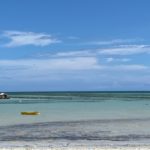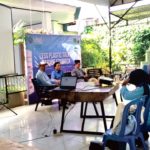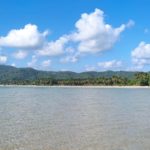Tropical marine and coastal ecosystems – coral reefs, mangroves, seagrasses – are vital for the livelihoods, food security and well-being of millions of people in Southeast Asia. However, many families are locked in poverty as the marine resources that they depend on dwindle due to destructive practices, overharvesting and the deterioration of ecosystems. Clearly the current way we manage tropical marine resources is not working. We therefore need new or improved approaches to – or innovations in – marine management.
In Project 2 of Blue Communities, we are analysing promising marine planning models in three UNESCO Man and Biosphere Reserves in Indonesia, Philippines and Vietnam, and a large marine park in Malaysian Borneo. Using a newly designed Participatory Marine Governance Analysis toolkit, we are seeking to discover the ingredients of – and obstacles to – success so that we can find opportunities to improve management of these reserves and parks. And then share this learning across the reserves and parks, and more widely. By understanding this, we can reveal how the Blue Communities programme can add value to existing efforts and investments in marine management in the region.
Blue Communities researchers in each country invited key practitioners managing the reserves to be part of their project 2 team. The practitioners offer an insider’s perspective on the workings of the reserve and increase the chances that the findings of project 2 will be acted upon.
At an event in Kuala Lumpur, these practitioner and academic teams received training from UK researchers in participatory methods, which help those involved in implementing a new marine management approach to reflect on what has worked, what has not worked, and what could be done better in the future. Each team is now planning their research in their case study marine reserve.
The Western Philippines University (WPU) project 2 team began field activities in October 2018, studying the Environmental Critical Areas Network (ECAN) in the province of Palawan, an island in the west of the Philippines. Through the ECAN, the seas of Palawan are being designated as biologically important core zones, where human activity is prohibited, and multi-use zones, where limited small-scale fishing, mariculture, recreation and education and research activities are permitted. The team sought to learn from its implementation so far to support future zoning efforts.
A workshop was held with provincial level actors and a workshop in the municipality of Aborlan, which has been a frontrunner in implementing ECAN at the local level. Firstly, participants at each workshop conducted an innovation history analysis, whereby timelines of the establishment and implementation of ECAN were co-created by stakeholders, who then discussed what lessons could be learnt so far. Secondly, they mapped on flip chart paper the key people and organisations involved in or affected by ECAN, the important and challenging relationships between them, and created towers to represent how influential they perceived each actor to be on the successful implementation of ECAN. The team is currently analysing the results, but some previously unrecognised challenges were identified that are likely to have major implications for how ECAN is rolled out across marine areas of Palawan.
Fieldwork begins in Indonesia, Malaysia and Vietnam over the next three months, with Project 2 research promising to make significant contributions to helping stakeholders in each case to understand issues with, and opportunities to improve, their current governance approaches. We hope for the teams to share what they have learnt from their cases with each other at the Blue Communities annual meeting in 2019.
By Dr Matt Fortnam, University of Exeter
Source: www.blue-communities.org





